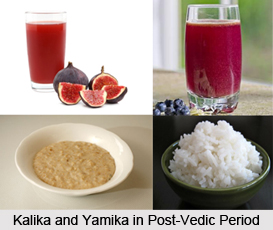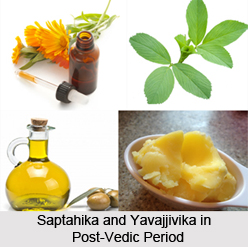 In the post-Vedic age, which may be identified with the Buddhist period of Indian history, Indian medicine reached to its highest peak of glory on a rational or more or less scientific basis. This is also known as the age of the "Ayurveda" (Knowledge of Life). During this period, the religion of Buddha or the enlightened one was dominating the Indian society. Its liberal and rational ideas, which recognised no cast and creed and welcomed all into its fold, and its freedom of mysticism, restrictions and rigidity of rites and ceremonies, prepared a congenial atmosphere for the growth of a rational system of medicine.
In the post-Vedic age, which may be identified with the Buddhist period of Indian history, Indian medicine reached to its highest peak of glory on a rational or more or less scientific basis. This is also known as the age of the "Ayurveda" (Knowledge of Life). During this period, the religion of Buddha or the enlightened one was dominating the Indian society. Its liberal and rational ideas, which recognised no cast and creed and welcomed all into its fold, and its freedom of mysticism, restrictions and rigidity of rites and ceremonies, prepared a congenial atmosphere for the growth of a rational system of medicine.
Medicine in the post-Vedic period may be said to have emerged out of empirico-magical medicine of the Vedic age and developed under the influence of highly philosophical ideas of the Samkhya, Vedanta and other schools of thought into an empirico-rational system of medical teachings and practices.
During the Buddhist period the care of human beings suffering from various illnesses, was taken to be a prime duty of any Buddhist. During that period the methods of treatment were principally based on the teachings of Atreya, the famous physician of Harappa in the Indus Valley. Buddha himself was a great physician who practised medicine and attended any sick person who sought his help.
With the advent of Buddhist medicine anatomical dissections were permitted which helped in the enrichment of the knowledge of anatomy. During the Buddhist period medical emissaries were sent to Tibet, China and further East to Korea and Japan, to the West into Persia, Mesopotamia and Central Asia. Those emissaries were known as the "Pramukhas".
The Buddhist monks were often affected by seasonal diseases. Buddha advised the monks to take 4 types of medicines, like the Kalika, Yamika, Saptahika and Yavajjivika.
Kalika: In the Buddhist Pharmacopoeia, the Kalikas were the pulp of boiled rice or any other grain called "Manda", porridge or boiled rice called "Odana", sour gruel or "Kulmasa", meat or "Mamsa" and cakes prepared from flour or "Opupa".
Yamika: The Yamikas were 8 types of drinks, like "Cocapanam" prepared from cinnamon bark; "Mocapanam" prepared from plantain trees; "Kolapanam" a drink prepared from Jujube tree; "Asvatthapanam" a drink prepared from the fig tree; "Udumburapanam" a drink prepared from berries; "Mrdvikapanam" a drink prepared from grapes and "Kharjurapanam" a drink prepared from dates.
Saptahika: The Saptahikas are: Sarpi or Ghee; Taila or oil; Phanita, Juice of sugarcane; Madhu or Honey; Sarkara or dry sugar.
Yavajjivika: The Yavajjivikas were Mulabhaisajya or root medicine; Ganda bhaisyajya or Tubers; Patrabhaisajya or leaf medicine; Puspabhaisajya or flower medicine; 5 Jatus or lac like silajatu; 5 Ksaras like alkalis; 5 Lavanas or salts and 5 Kasayas or astringents like haritaki.
So it can be assessed that what was the profound pharmacological knowledge of Buddha in the treatment of various diseases during his period.
Related Articles
Primitive Medicinal Practices in India
Indian Naturopathy
Ancient History of India
Ayurveda
Indian Medicinal Plants
Traditional Indian Medicines
Gautama Buddha
Birth of Gautama Buddha
Legends Surrounding Gautama Buddha
Teachings of Buddha
Buddha"s Great Enlightenment




















